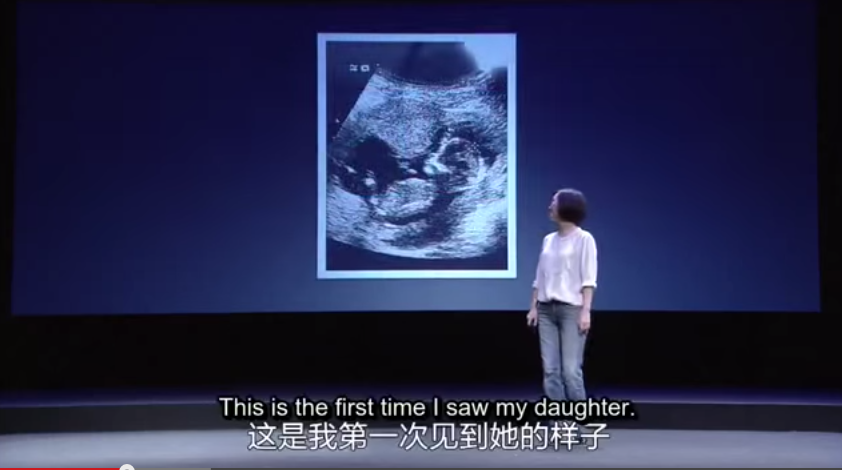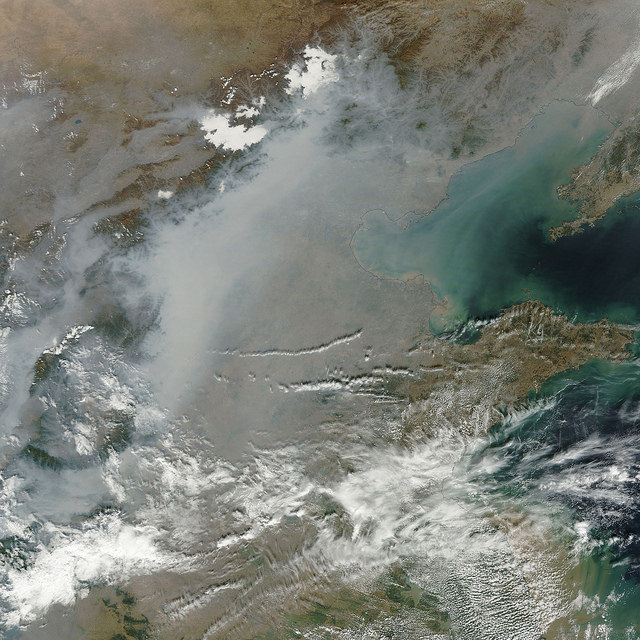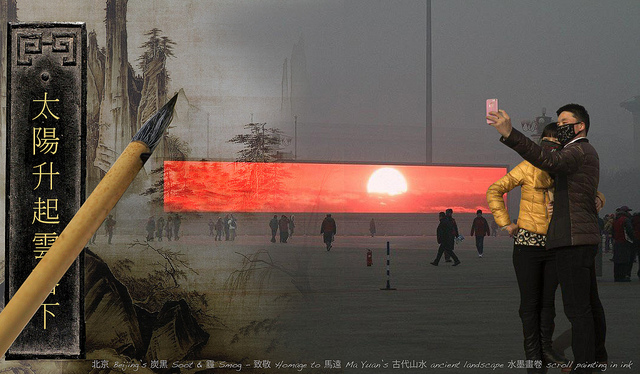The Movie Taking China By Storm: Under the Dome Posted by sasha on Mar 9, 2015 in Uncategorized
Unless you’ve been living under a rock for the past week in China, you’ve heard about the new documentary that has taken the country by storm – “Under the Dome” (穹顶之下 – qióng dǐng zhī xià). Produced by former CCTV journalist Chai Jing (柴静) over the course of a year, this 103-minute long film takes an in-depth look at the biggest issue confronting modern China – the country’s horrendous pollution. In just a few days, over 200 million people had seen the film and were discussing it all across social media. It has also attracted a lot of attention from the Chinese government, who eventually decided to remove the video from Chinese sites. People are already calling it China’s “An Inconvenient Truth,” and this hard-hitting look at a controversial topic is sure to have a huge impact. For those who haven’t been following this story, here’s a quick recap as well as a personal anecdote on the topic of pollution in China:
The Making of the Film
When Ms. Chai was told that her unborn daughter already had a benign tumor in 2013, she got to thinking about her child’s future, especially the matter of her health living in smog-covered Beijing. After her daughter was born and underwent a successful operation, the famous journalist quit her job and embarked on a year-long investigation to answer three questions she knew her daughter would eventually ask:
-
What is smog? (雾霾是什么? – wù mái shì shén me)
-
Where does it come from? (它从哪里来? – tā cóng nǎ lǐ lái)
-
What can we do? (我们怎么办? – wǒ men zěn me bàn)
Throughout the year, she gained unprecedented access into the heavily polluting industries that dominate the Chinese economy, as well as the government organizations that are supposed to regulate them. In many ways, she has shed light on an issue that has remained very much in the dark despite public outcry for accountability and solutions. Although they’ve been talking about pollution constantly across China, there hasn’t been such a high-profile investigation into the issue until now. It should be mentioned that the project was entirely self-funded, and Ms. Chai spent over 1 million RMB ($167,000) to finish it.
A Brief Synopsis

A screen shot from the beginning of the film.
The documentary resembles a TED Talk, as Ms. Chai addresses a small audience with the aid of slides, graphs, pictures, and the occasional video. It begins with the story of her daughter and other children born with similar problems around the country. She talks of how she felt like her child was being kept a prisoner inside of their Beijing home, as she didn’t want to take the girl outside on days with high levels of pollution – 175 days in 2014 alone. In another clip, she interviews a 6-year old girl in the heavily polluted province of Shaanxi who says she has never seen stars, a blue sky, or white clouds.
Throughout the rest of the film, she discusses the causes of China’s pollution and the failure of regulations and enforcement all across the country. In particular, she delves into the issues of coal, an increase in personal automobiles, illegal trucks burning poor quality fuel, and a lack of oversight and enforcement of laws across all of these huge industries. Personal stories – such as her trip back to her hometown – are mixed in with interviews and spotlights on the stories of others, making the film full of scientific data and jargon much more personal. Her words are powerful and thought-provoking, most notably when she says:
“Honestly, I am not afraid of dying. I just don’t want to live this way anymore.”
In an effort to show possible solutions and hope for the future, she also discusses the dire situation of 1950s London and the reforms that took place over the coming decades to clean up the city’s terrible air. She also visits Los Angeles – a city that has had a huge air pollution problem – and spotlights the changes that have been made there to deal with it. It’s not just mega-cities like Beijing that have a pollution problem in China, as she shows examples from all corners of the Middle Kingdom. Through dozens of interviews with professors, scientists, and government officials, she also lays out potential solutions to this grave problem facing not only China, but the entire world.
For an in-depth look at the film and its content, check out this great article.
Reaction and Controversy
The film spread like wildfire across the Chinese internet with over 100 million people watching it in the first few days. Initially, it garnered much praise from officials in the government, including newly appointed environmental protection minister Chen Jining. In a People’s Daily article, he said “I want to thank her. She has wakened up the public to pay attention to the environment from a public health perspective.” Not surprisingly, the film has also generated a good amount of controversy since its release. Some have claimed that the whole thing was a publicity stunt to stir up the public on the issue before it is addressed this week at the annual meeting of the National People’s Congress. Others have called her a hypocrite since she and her husband were well-off enough to have their daughter in the United States. The reaction has been primarily positive, though, especially on Chinese social media where hundreds of millions of posts have been made in response. Perhaps the success of the film made some in power nervous, as it has since been removed from Chinese video sites like Youku and Tudou. The full version can still be found on YouTube and includes English subtitles:
Personal Experience
Having lived, worked, and traveled in China since 2008, I’ve had plenty of experience with the country’s notoriously bad pollution. When I lived in Beijing, there were so many days where I looked out the window and loathed the fact that I had to go outside and breathe in the filthy air. On trips to Hebei, Shaanxi, and Heilongjiang, I was shocked at the levels of air pollution. Through the years, I began noticing more and more people wearing face masks. The masks themselves have been getting more and more high-tech, and developers of these as well as air purifiers have made a killing in recent years. As a person who loves the great outdoors, it was depressing to live in a perpetual haze where it is literally unsafe to go for a walk. It eventually got to be too much, and I decided to quit my good job, leave my nice apartment, and bid farewell to Beijing. I moved down south to Kunming, provincial capital of Yunnan, where there’s a blue sky nearly every day. It’s still China, though, and pollution seems to be getting worse here just as it is all over the country. As a matter of fact, it’s getting to the point where I’m seriously considering leaving China entirely. If I had children, I would already be long gone.
The air quality in China gets a lot of attention in Western media, but most people are content with brushing it off as “not my problem.” Having lived here and seen the effects of pollution firsthand, I have realized that this is a human problem, not merely a Chinese or a developing world one. Hopefully this documentary will make a splash in other countries and will encourage a more robust debate around the globe about this crucial problem facing us all. Once again, a film has got people talking about pollution. What remains to be seen is whether or not anything is done about it.

Build vocabulary, practice pronunciation, and more with Transparent Language Online. Available anytime, anywhere, on any device.
About the Author: sasha
Sasha is an English teacher, writer, photographer, and videographer from the great state of Michigan. Upon graduating from Michigan State University, he moved to China and spent 5+ years living, working, studying, and traveling there. He also studied Indonesian Language & Culture in Bali for a year. He and his wife run the travel blog Grateful Gypsies, and they're currently trying the digital nomad lifestyle across Latin America.






Leave a comment: